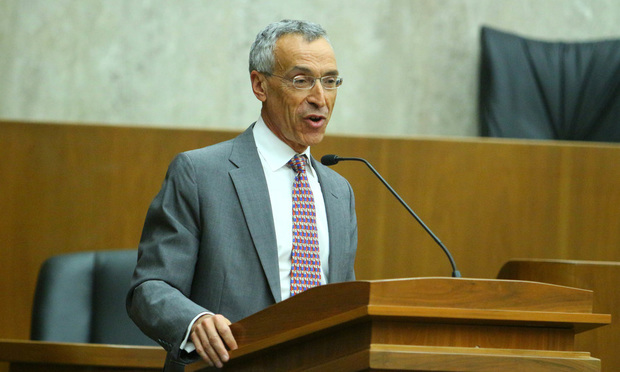Monsanto Appeals First Federal Roundup Verdict
The March 27 verdict, for plaintiff Edwin Hardeman, defied "regulatory judgment" and "sound science," Monsanto's lawyers wrote in their brief before the U.S. Court of Appeals for the Ninth Circuit.
December 16, 2019 at 03:03 PM
4 minute read
 Seth Waxman.
Seth Waxman.
Monsanto Co. has asked a federal appeals court to reverse a verdict over its herbicide Roundup that it said "defies both expert regulatory judgment and sound science."
In a Dec. 13 brief, former U.S. Solicitor General Seth Waxman and other lawyers for Monsanto, owned by Bayer AG, asked the U.S. Court of Appeals for the Ninth Circuit to reverse the $80 million verdict, later reduced to $25.3 million. They cited federal preemption, "serious legal errors" on causation, and a lack of Monsanto's alleged "reprehensible conduct" justifying punitive damages. The trial, according to Monsanto, was the first in federal court, where 5,000 Roundup lawsuits are pending.
"This appeal has the potential to shape how every subsequent Roundup case is litigated," wrote Monsanto's legal team, led by Waxman, of Wilmer Cutler Pickering Hale and Dorr in Washington, D.C. "That verdict defies both expert regulatory judgment and sound science."
Joining Waxman on the brief were firm partner Paul Wolfson, also in Washington, D.C., as well as former U.S. Homeland Security Department general counsel Philip Perry and Richard Bress, both at Latham & Watkins in Washington, D.C.
Covington & Burling, Bryan Cave Leighton Paisner and Wilkinson Walsh + Eskovitz, which represented Monsanto at trial, also had lawyers on the brief.
Jennifer Moore, of Moore Law Group in Louisville, Kentucky, and Aimee Wagstaff, of Andrus Wagstaff of Lakewood, Colorado, who represented the plaintiff, Edwin Hardeman, did not respond to a request for comment. Leslie Brueckner, a senior attorney at Public Justice, who joined the plaintiff's legal team this month, also did not respond.
Hardeman's March 27 verdict was the second to find that Roundup caused someone to get non-Hodgkin lymphoma. A previous jury, in San Francisco Superior Court, had awarded $289 million, later reduced to $78 million, and jurors in Alameda County Superior Court awarded $2 billion to a California couple May 13.
In Hardeman's case, U.S. District Judge Vince Chhabria of the Northern District of California refused to toss the award, including punitive damages, citing Monsanto's "reprehensible" conduct. But he lowered punitive damages, which he considered "constitutionally impermissible," to a 4:1 ratio to Hardeman's compensatory damages.
That still was unjustified, Monsanto's lawyers wrote in their Ninth Circuit brief, particularly given that the scientific literature when Hardeman was diagnosed in 2015 found that Roundup ingredient glyphosate did not cause cancer in humans.
Monsanto also continued to insist that Chhabria should have allowed it to introduce the conclusions of not just the U.S. Environmental Protection Agency, which found glyphosate to be safe, but those of numerous regulatory agencies around the world. Plaintiffs lawyers had relied on the 2015 decision by International Agency for Research on Cancer, which classified glyphosate as a carcinogen.
"Even though expert regulatory agencies worldwide, including the EPA, have concluded that glyphosate does not cause cancer, and even though no scientific studies have yielded reliable evidence of such causation, the district court allowed the jury to return a massive verdict against Monsanto," Monsanto's lawyers wrote.
Monsanto also argued that the Federal Insecticide, Fungicide, and Rodenticide Act preempted Hardeman's claims. Citing the U.S. Supreme Court's decisions in Wyeth v. Levine and Merck Sharp & Dohme v. Albrecht, its lawyers argued that Monsanto could not have warned consumers about Roundup's alleged cancer risks, even if it wanted to, because there was "clear evidence" that the EPA would have rejected such a label change.
It also challenged Chhabria's rulings allowing plaintiff's causation experts, who "cherry-picked data from flawed studies," and his jury instructions relating to causation.
"Hardeman's suit should never have gone to the jury because his expert opinions on the central issue in the case—whether glyphosate caused Hardeman's illness—should not have been admitted," Monsanto's lawyers wrote.
This content has been archived. It is available through our partners, LexisNexis® and Bloomberg Law.
To view this content, please continue to their sites.
Not a Lexis Subscriber?
Subscribe Now
Not a Bloomberg Law Subscriber?
Subscribe Now
NOT FOR REPRINT
© 2025 ALM Global, LLC, All Rights Reserved. Request academic re-use from www.copyright.com. All other uses, submit a request to [email protected]. For more information visit Asset & Logo Licensing.
You Might Like
View All
Devin Nunes, Former California GOP Congressman, Loses Move to Revive Defamation Suit
6 minute read
'Close Our Borders?' Senate Judiciary Committee Examines Economics, Legal Predicate for Mass Deportation Proposal
3 minute read
A Judge Asks: Is It Time to End Ken Feinberg's Roundup Settlement Program?
7 minute read
Law Firms Mentioned
Trending Stories
- 1Uber Files RICO Suit Against Plaintiff-Side Firms Alleging Fraudulent Injury Claims
- 2The Law Firm Disrupted: Scrutinizing the Elephant More Than the Mouse
- 3Inherent Diminished Value Damages Unavailable to 3rd-Party Claimants, Court Says
- 4Pa. Defense Firm Sued by Client Over Ex-Eagles Player's $43.5M Med Mal Win
- 5Losses Mount at Morris Manning, but Departing Ex-Chair Stays Bullish About His Old Firm's Future
Who Got The Work
J. Brugh Lower of Gibbons has entered an appearance for industrial equipment supplier Devco Corporation in a pending trademark infringement lawsuit. The suit, accusing the defendant of selling knock-off Graco products, was filed Dec. 18 in New Jersey District Court by Rivkin Radler on behalf of Graco Inc. and Graco Minnesota. The case, assigned to U.S. District Judge Zahid N. Quraishi, is 3:24-cv-11294, Graco Inc. et al v. Devco Corporation.
Who Got The Work
Rebecca Maller-Stein and Kent A. Yalowitz of Arnold & Porter Kaye Scholer have entered their appearances for Hanaco Venture Capital and its executives, Lior Prosor and David Frankel, in a pending securities lawsuit. The action, filed on Dec. 24 in New York Southern District Court by Zell, Aron & Co. on behalf of Goldeneye Advisors, accuses the defendants of negligently and fraudulently managing the plaintiff's $1 million investment. The case, assigned to U.S. District Judge Vernon S. Broderick, is 1:24-cv-09918, Goldeneye Advisors, LLC v. Hanaco Venture Capital, Ltd. et al.
Who Got The Work
Attorneys from A&O Shearman has stepped in as defense counsel for Toronto-Dominion Bank and other defendants in a pending securities class action. The suit, filed Dec. 11 in New York Southern District Court by Bleichmar Fonti & Auld, accuses the defendants of concealing the bank's 'pervasive' deficiencies in regards to its compliance with the Bank Secrecy Act and the quality of its anti-money laundering controls. The case, assigned to U.S. District Judge Arun Subramanian, is 1:24-cv-09445, Gonzalez v. The Toronto-Dominion Bank et al.
Who Got The Work
Crown Castle International, a Pennsylvania company providing shared communications infrastructure, has turned to Luke D. Wolf of Gordon Rees Scully Mansukhani to fend off a pending breach-of-contract lawsuit. The court action, filed Nov. 25 in Michigan Eastern District Court by Hooper Hathaway PC on behalf of The Town Residences LLC, accuses Crown Castle of failing to transfer approximately $30,000 in utility payments from T-Mobile in breach of a roof-top lease and assignment agreement. The case, assigned to U.S. District Judge Susan K. Declercq, is 2:24-cv-13131, The Town Residences LLC v. T-Mobile US, Inc. et al.
Who Got The Work
Wilfred P. Coronato and Daniel M. Schwartz of McCarter & English have stepped in as defense counsel to Electrolux Home Products Inc. in a pending product liability lawsuit. The court action, filed Nov. 26 in New York Eastern District Court by Poulos Lopiccolo PC and Nagel Rice LLP on behalf of David Stern, alleges that the defendant's refrigerators’ drawers and shelving repeatedly break and fall apart within months after purchase. The case, assigned to U.S. District Judge Joan M. Azrack, is 2:24-cv-08204, Stern v. Electrolux Home Products, Inc.
Featured Firms
Law Offices of Gary Martin Hays & Associates, P.C.
(470) 294-1674
Law Offices of Mark E. Salomone
(857) 444-6468
Smith & Hassler
(713) 739-1250






